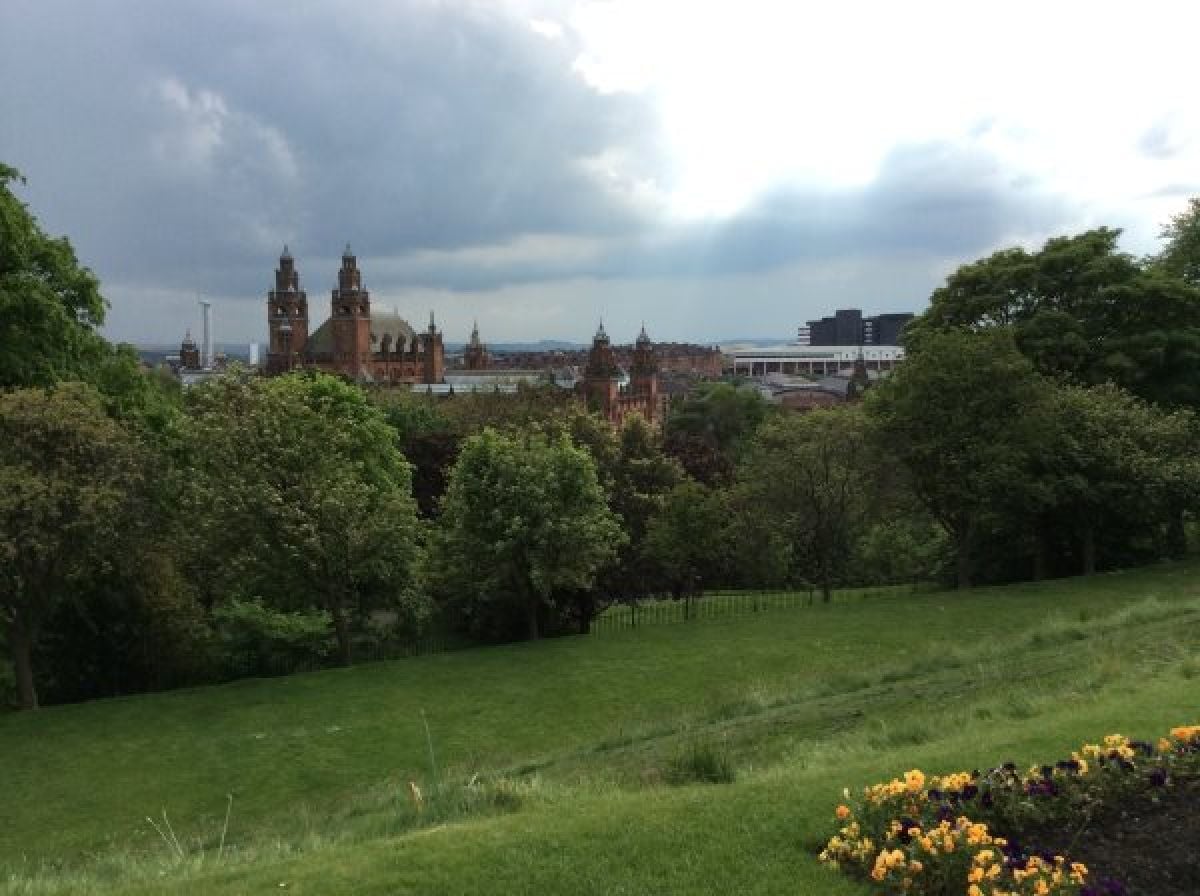
Why did you decide to move to Anniesland, Glasgow?
My wife chose to enter the University of Glasgow in 2013 for her doctor of veterinary medicine degree. I helped her move from California to Glasgow and then had to return to California for a short while, in order to finish collecting my dissertation research data. Since done with the dissertation (THANK GOD!!!), I find myself in the position of under-employed dependent spouse! More rich learning!
How was the moving process?
The moving process was a long, drawn out affair that started 7 months before the move. Plus, my wife Amanda and I had to move in with a friend of hers for the last month before leaving the States because our rental lease was up. That complicated matters. Up until the last moment I was having an adventure selling our stuff over Craigslist (e.g., furniture, electronics, artwork). I wasn't hot on the idea of maintaining a large storage unit in the States for 5 years while Amanda completed her veterinary medicine program. We still ended up needing to rent a unit; a small 5 by 5 footer, fortunately.
The day of the move, the flight to Glasgow-required checking-in 12 pieces of luggage, including suitcases and well-taped moving boxes. We'd purchased extra "baggage allowance" in advance, to get a better rate. Including carry-ons, we took 17 pieces of luggage onboard the airplane that day. We also wanted our cat Monkey to come along, though we asked our same friend to ship her a week after we'd arrived to Scotland ourselves because lugging Monkey plus so many luggages would've been too much for two people to handle in one day. Sure enough, I was on high alert, and quite conscious of the ridiculous spectacle we made getting checked in at SFO. But it was humbling, too, because for once we were "those people," the travelers carting a lot of stuff; immigrants, really. Once items were checked-in, we were on our way. Eighteen hours later at the other end in Glasgow we needed to hire a large taxi van to take us and all our luggage to our new apartment 7 miles from the airport in Anniesland. First we had to stop at a "letting agency" to pick up our move-in paperwork and keys. At the moment Amanda went to leave the taxi, she discovered her passport was missing. Long story short, she'd left it on the airplane and after two trips to the consulate in Edinburgh and 1.5 months later she suddenly got a phone call saying her passport (and visa!) had been turned in. She would've had to spend another $500 to get those reissued. Anyway, there we were at the letting agency. Would they still give Amanda the apartment keys without her passport? Luckily, yes. I ended up going ahead with the boxes because our taxi meter was running while Amanda was stuck inside. I forked out 50 pounds for that ride, but how else could I transport our stuff in one fell swoop to our new place? After arriving and carrying each piece of luggage upstairs, voila! The move was basically complete.
What are the formalities you had to undergo in order to be able to live in Scotland? What does the dependent status grant you?

I'm actually not a legal resident in Scotland yet. I had to enter the country in January as a tourist because my other passport (I'm a dual citizen of Australia and the U.S.) was held-up at the U.K. Border Agency in New York City. That's another story. My initial visa application was denied, though I appealed the decision and ultimately "won" the case. Instead of receiving my visa end of September, it took until March to finally get it. That was scary because during the first, somewhat convoluted application process I had to show $6,500 in my bank account, and had I needed to completely reapply again, I would've needed extra funds from somewhere/someone. Fasting forward: What will the dependent status grant me once I'm a resident? Well, first, I'll have to leave the country and then reenter using my passport with the dependent visa. The border patrol will review my visa, stamp my passport, and enter me into their database as a legal, temporary resident. I was hassled by Customs for 20 minutes in January while entering the country as a 6-month tourist (not fun). After I re-enter Scotland this coming June and register with the local community authorities (separate paperwork), I can receive routine medical care at the neighborhood doctor and dentist. Also, I'm legally allowed to work full-time -if I can find work- which was a surprise. Other countries don't grant this right to certain dependents, such as the U.S. in the case of dependents of foreign technical workers (H1-Bs).
Did you face some difficulties to adapt to your host country (language, culture, do's and don'ts)?
The first "shock" is the weather. Glasgow's 55 degrees north-on the level with Moscow-so the days in January are very short: The sun sets around 3:45 pm. In wintertime it's also usually drizzling, if not raining many days, and the rain's cold, and feels even colder if it's windy, which it usually is. I've lived in arctic Minnesota (U.S.A.) on the border with Canada, so I know subzero temperatures, but strangely enough, Glasgow's near-freezing wintertime rain feels somehow colder. It chills to the bone. Now that were into spring, temperatures are rising (a bit) and trees and flowers are in bloom. All the precipitation does lead to rich and abundant flora and fauna, even very near the city center, so that's nice!
Back to difficulties: Language-wise, the accent can be difficult to understand, especially with older folks like taxi drivers who don't strive to articulate for foreigners. Certain words also mean different things here, like "pants" in Scotland refers to underwear. You can imagine what happened when Amanda told her Scottish colleague she'd "dirtied her pants": embarrassment, but that's the way to learn quickly. Also difficult is what looks like lack of friendliness out on the sidewalk. Pedestrians keep to themselves; people rarely make eye contact when out walking like they do in Northern California, and it's not just me; I've asked other expats. Multiple times I've smiled at locals to either get ignored, blank stares, or a funny look in return. The most unsettling difference, however, is the fact that pedestrians don't seem to get the right of way here like they do in California, even in crosswalks. Crossing roads on foot feels downright dangerous; even crossing parking lots is hazardous. A few times I've had to literally jump out of the way of a speeding car.
What surprised you the most in Glasgow?
Other than getting hit by automobiles, the physical and psychological impact of the length of days here has surprised me the most. Already yesterday (in May), the sun sets after 9 pm, and we'll get a total 17 hours of daylight at the height of summer. It's disorienting to look outside and completely guess the time wrong. I've also been eating dinner later and later, and that's caused me to go to bed later and later. Another surprise is the number of folks who still smoke cigarettes out in public. Many more people out in public also look relatively unhealthy, compared to in northern California, and California in general, where looking good is a (stressful) value. Also, sorry to say it, but the food and food selection is lacking here. Indian, Chinese, and fish and chips "takeaways" get old quickly, and grocery stores don't stock as much health food, compared to California, but that's probably obvious. The cheese tastes better here, though, and a other food items seem fortunately less-processed, too.
Could you please share with us something you like about Glasgow and something you don't like?
In these early stages of cultural adaptation I'm easily annoyed with cultural differences. Research shows that what is perceived as different is generally perceived as "wrong," and I find myself complaining to Amanda about cultural differences, but this will pass in time the more I "give in" and learn to cultivate new cultural "tastes." I do like the architecture of downtown Glasgow and the University of Glasgow, although Edinburgh's got them beat in this regard. Edinburgh's stunning.
In Glasgow, I like living at the doorstep to the Highlands of the north. I like how Scots take advantage of good weather when it happens. I like Glasgow's diverse population, and the fact that different social classes mingle downtown. I especially like Kelvingrove Art Museum, and the train system is predictable and clean. Busses are less regular than California, though. What I least like so far is the weather and food though, and those are big factors.
A common belief about Scotland which wasn't right:
That Scots are subliminally "at war" with the English to the south. I have yet to hear too many complaints, in actuality, though closer to the border this may become an issue.

What do you miss the most from the US, where you grew up?
I miss enthusiastic (even if "fake") and faster customer service, friendlier people out on the sidewalks, traffic running in the other direction (so I know in which direction to look), wider selection of restaurants and more healthy food options, big American breakfasts, baseball on the television, and living in proximity to good ski resorts. It does snow in the highlands in winter, but the temperatures hover around freezing-making for slushy conditions-and the wind can blow pretty hard.
You lived in several countries: what have you learned from the different cultures you lived in and where do you feel most like home?
In Australia I learned a sort of ironic humor and to relax. In Germany I learned about precision and protocol. In America I've learned optimism and no-limit thinking. I feel at home in San Diego, California. The weather can't be beat and like the surfer mentality. I feel most at home in Heidelberg, Germany, where my Dad's parents lived for years, right there on the Neckar river, across from the old romantic Schloss (castle).
Your research project for your PhD is focused on culture shock: why did you decide to focus on that topic and what does your study reveal?
The question of cultural identity has always vexed me. Could a person learn to be truly comfortable wherever he or she is living, understanding him/herself as "citizen" of the world? Was it truly possible to develop additional cultural identities? Also, the psychological literature was devoid of a single intervention developed to reduce culture shock or specifically help a person adapt cross-culturally, and I found myself on a university research team working with a very unique counseling intervention designed to facilitate traditional bereavement. I wondered: Would a similar intervention process reduce culture-shock and negative affect in culture-shocked expatriates? Would a grief intervention help individuals receive insights into cultural adjustment?
Extraversion, home country, and importance of religion/spirituality were significant covariates in change on total culture shock scores from pretest to posttest, and participants reported a significant increase in comfort both at posttest and follow up. Thematic content analysis of post-meditation interview transcripts revealed four categories of effects: clarified emotional conflicts, letting go, shifted perspectives, and reviewed success factors. Results lay the foundation of future meditation interventions for culture-loss related bereavement.
Which advice would you give to people wishing to live in Glasgow?
Realize how far 55 degrees north is and understand the potential psychological (e.g., Seasonal Affective Disorder) and physical consequences. Though the spoken language is English, Scots have a very unique culture forged from surviving the elements. They are a proud and vigorous people with particularly strong ties to other Scots, especially their families.



















